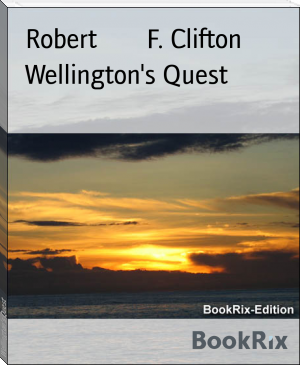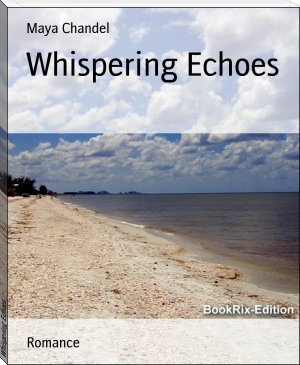Wellington's Quest - Robert F. Clifton (beach books .TXT) 📗

- Author: Robert F. Clifton
Book online «Wellington's Quest - Robert F. Clifton (beach books .TXT) 📗». Author Robert F. Clifton
“Leave both right here. I'll have my men unload your seed and grain and take your jack and wagon to my barn. Meanwhile my friend climb up here into my carriage. You will spend the rest of the day and of course the night with me. I will try to ascertain as much information as I can about what happened down in the valley”, said Wilcox.
That evening as they sat at the dinner table, Wilcox dipped the end of a cigar into a sniffer of brandy, then leaning back in his chair, lit the cheroot and blew a blue-white puff of smoke into the air. “If you remember our meeting at the annuity payments I told you the government, the Indian Agents and the traders were cheating the Sioux at the Redwood Agency. You might also recall the fact that I mentioned that the traders wanted the annuity payments made to them, not to the Sioux.
Well, that's exactly what happened. It seems that Manosapa and his chief's demanded the annuity from Galbraith. Naturally, the traders refused to give credit under those conditions. Evidently, they met, trying to resolve the problem, but the meeting failed in a conclusion that would have solved the situation. Apparently, bad blood began to rise in the Sioux men. In all probability some of the warriors got a taste of whiskey. The report that I'm getting over the telegraph is that four Braves went out hunting. More than likely they were drunk. In any event they killed five settlers. That was probably the spark that ignited the entire massacre. The report sent to me is that on the night of August the seventeenth, eighteen sixty two, the elders held a council and made the decision to attack all of the settlements throughout the Minnesota River Valley.
As for the number killed, it is only an estimate. As I told you earlier, some say five hundred, others say eight hundred. At this point my friend, I'm afraid there is more bad news. The authorities are saying that as many that were killed the same number were taken captive as slaves. I'm sorry Jim. I pray that your family and fiance' are safe.”
Jim sat in silence for a moment, then said, “Now you know why I must be going. They might need me. She might need me”.
“Of course, but you'd be no use to them tonight on a dark road with a tired animal. Rest here. Have a hearty breakfast in the morning, then go', suggested Wilcox.
“I guess you're right”, Jim answered.
“Of course I am. Now, come with me. We'll go into my study. There are a couple of things I want to give you”, Wilcox replied.
Both men left the table with Jim following his host. Walking into the study Jim noticed the aroma of gun oil and saddle soap. He noticed the leather covered chairs and sofa and the glass front gun cabinet.
Milford Wilcox pulled a gold, key chain from his trouser pocket, removed a key and unlocked the cabinet door. Opening the breakfront he took a step back. “Take a look at these Jim. This is more or less my passion. I enjoy the thrill of making a deal in business, nonetheless, collecting firearms and shooting gives me real joy. Sort of a hobby, if you will'.
Standing next to Wilcox, Jim looked at the various pistols, revolvers and rifles in the cabinet. “Very Impressive”, he said.
Wilcox reached into the locker and removed a revolver and holster. “Here, take this. Wear it all of the time. At least until things return to normal”, he said.
“Thanks Milford, but I don't know anything about pistols or revolvers. I shoot an old, flintlock Pennsylvania rifle when I hunt and I haven't hunted in over a year,” he replied.
Removing the revolver from the leather holster, Wilcox said, “This weapon came out in eighteen sixty. It's the Colt Army Revolver. It has a six shot cylinder and comes with a seven and a half inch barrel or an eight inch barrel. This is the eight inch barrel. It fires a forty four caliber projectile. The Navy model fires a thirty six caliber bullet. You can see that this piece is a cap and ball, using black powder. Some use a paper cartridge. This revolver uses caps. The thing to remember is that the powder charge is thirty eight grains.”
“Milford, I appreciate your offer, but I can't take your revolver and I sure as hell can't pay you for it”, said Jim.
Wilcox reached into the cabinet again and removed another, identical Colt forty four. “No one asked you to pay for it and I'd be bothered if you didn't accept my gift”.
“Well, since you put it that way and have another, I'll say thank you. I appreciate it”.
“Good, but we're not done yet. I want you to have this”, said Wilcox, removing another weapon from the cabinet.
“What is it?”, asked Jim.
“This is a model Springfield percussion, rifled, carbine. It fires a sixty nine caliber ball. With the barrel being only twenty six inches long it makes it easier to maneuver from either a saddle or a wagon seat”, Wilcox explained.
As Jim inspected the carbine Wilcox's butler entered the room. “I beg your pardon sir, but a telegram has just arrived”.
Milford Wilcox opened the envelope and read:
Sioux uprising continues stop. Buildings at
lower Agency burned stop. Co. B 5th Minnesota
Reg. Defeated at Redwood Ferry stop. Killing
and burning continues in Valley stop.
Wilcox turned to the butler and said,” Thank you Henry. There's no return message at this time. Then, he handed the telegram to Jim. After reading the cable Jim said, “I've got to go. There are those that need me”.
“I understand how you feel my friend, but if a company of militia couldn't stop the Sioux, what can you do?”, asked Wilcox.
“I know I've got to try to protect those I love”, Jim responded.
“And, I know that there's no stopping you. That's why I want you armed when you go back to the valley”, said Wilcox,
The next morning employees of Wilcox brought the hitched mule and wagon to the Wilcox house. Jim shook hands with Milford Wilcox and said, “Thank you Milford. I appreciate all that you have done for me, especially, the weapons”.
“I pray that you never have to use them. Stay in touch. I have lawyers and business agents in both Mankato and Ulm if they're still alive.
Use them to telegraph me if there is anything you need. Here is a list of their names and businesses', Wilcox replied as he handed a sealed envelope to Jim.
“Thanks, I'll do that. Now, I must be on my way”.
After climbing up in the wagon and taking a seat, Jim shook the reins and the mule started forward. James Wellington began the long, apprehensive journey back to his farm. As he traveled, his mind raced. Was his family safe? Was Virginia alright? Oh, how he wished the mule could go faster, the miles shorter. He began to pray, praying for those he loved and cared for.
Chapter Three
Aftermath
As he sat drinking hot tea from a metal cup, glowing embers in the fire made him again recall those eventful times. He thought again of those August days of eighteen sixty two and how it was as he neared the homes and farms of his neighbors. He had been alerted by the aroma of woodsmoke in the air carried to him on a summer breeze, Unlike the smell of burning wood from a cook stove the odor reeked of burnt timbers and tar. Something else was present in the air, the stench of burnt and rotting flesh.
When he came to Clyde Dillard's farm he stopped the mule and sat looking at the burnt, red, brick house. The doors and windows were gone. Black soot coated the window frames. He saw the dead animals in the fields, their bloated bodies drawing flies. In the sky vultures flew overhead waiting for him to pass, so that they could land and feast. There was nothing he could do so he got the mule moving again and as he neared his home a fear of what he might find began to torment him.
Finally, arriving at the homestead he stood, looking at the sight before him. The house was gone as was the barn and all of the other outbuildings, all burnt to the ground. The milk cow had been killed and was putrefying in the summer sun. He climbed down from the wagon and walked slowly to the pile of burnt timbers and furniture all of which had been part of his home. Then, he stopped and closed his eyes, holding in the scream that he wanted to release from his throat as he gazed upon the body of his mother. She was on her back with her eyes open and even though her skin had darkened with approaching decay he saw the blood on her face that had come from the crushed skull that had killed her.
Eventually, he forced himself to move. As he walked his eyes darted left, right, forward, looking, searching. He saw something blue and he headed for it. As he got near he realized that it was the remains of Ben Connors. Jim stood over the body and saw that the man had been scalped and his throat cut. “Well Ben, we won't have any more arguments, will we?”, he said aloud.
Jim then began to look for his sister, Amanda. It took awhile, but he finally found her near what use to be the hen house. She was naked from the waist down. It was apparent that she had been raped, then killed. Jim bent down and with tears in his eyes pulled down her skirt and covered her nakedness.
He spent the rest of the day digging three graves. Fortunately, the Sioux had no use for a shovel and he found one in the ashes of the collapsed tool shed. The handle was scorched, but the tool was still serviceable. Each grave was marked with a crude cross made from elm branches. When he placed the last cross into the ground he turned with tears in his eyes knowing that those in their graves were the last of his immediate family. He turned and stood silently, looking towards the Martin farm. He wanted to go there, wanted to find Virginia and as he muffled a sob he silently prayed that she was safe and well. Looking up to the sky he saw the on coming darkness as night began to fall. He also felt the fatigue in his body, a tiredness that was lodged deep in his bones and he wanted to rest, to sleep, hoping to awake from a disturbing, bad, nightmare. But, he knew what had happened was real and would not go away with the dawn.
Jim slept that night under the sour apple tree with the carbine next to his body. The Colt revolver, loaded and ready was close at hand.
With the dawn he fashioned a bridal made of rope and rode the mule bareback to the Martin farm.
The scene there was the same as the Dillard and Wellington farms. All of the buildings had been burnt to the ground. All of the livestock had either been butchered or run off. He found Tom and Martha Martin, both dead, both scalped and mutilated. There was no sign of Virginia. To him it meant that she might still be alive. Then, it came to him that she might be better off dead. He spent the morning and part of the afternoon digging two more graves and burying two more bodies.
Hunger gnawed at his stomach and grief gnawed at his mind. In addition worry for Virginia's safety tormented him. He had to find her. In his heart he knew that she was alive. Perhaps, just perhaps she was away when the Sioux war party came to her farm. Maybe she was in Mankato or Ulm. She had a cousin in Ulm. He





Comments (0)